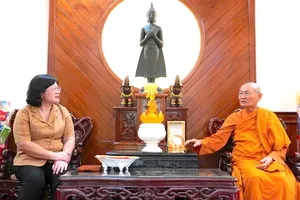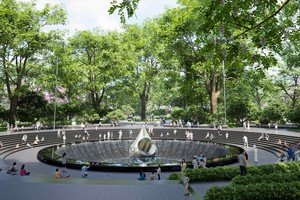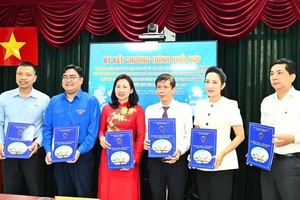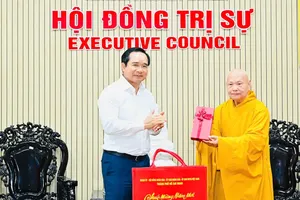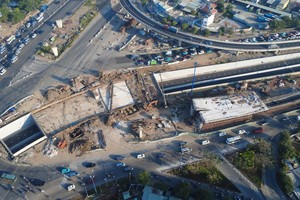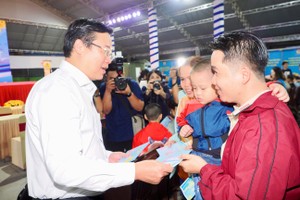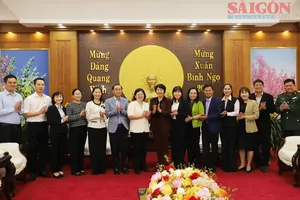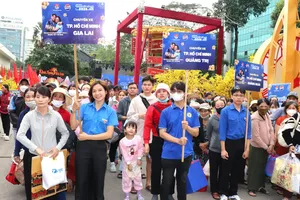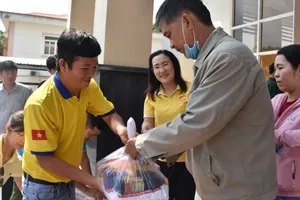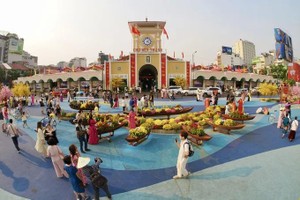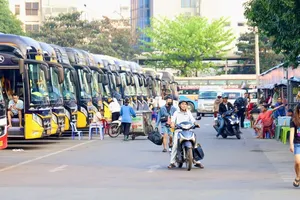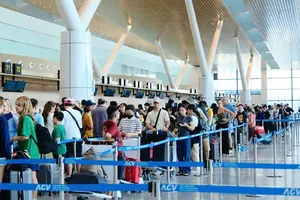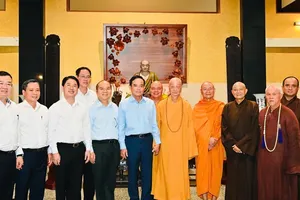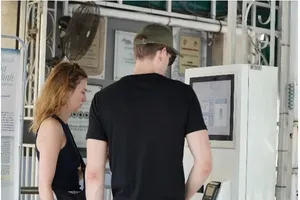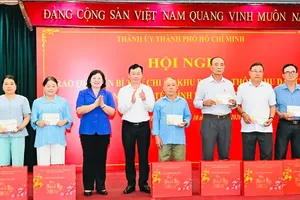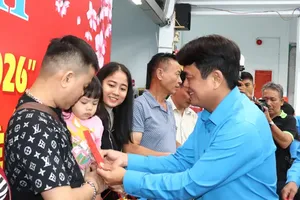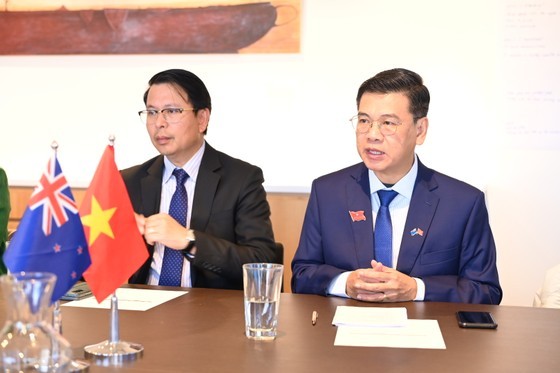 |
Mr. Nguyen Van Dung (R), Deputy Chairman of HCMC People's Council, speaks at the meeting. |
The delegation was accompanied by several members, including Mr. Nguyen Van Trung, Ambassador Extraordinary and Plenipotentiary of Vietnam to New Zealand; Ms. Pham Quynh Anh, Head of the Legal Department of HCMC People's Council; Ms. Tran Hai Yen, Deputy Head of the Culture and Social Affairs of HCMC People's Council; Mr. Huynh Thanh Hung, Deputy Head of the Economic and Budget Committee of HCMC People's Council; and Ms. Pham Tran Thanh Thao, Deputy Director of HCMC Department of Foreign Affairs.
Urban development for climate change adaptation
During the working session, Mr. Nguyen Van Dung, Deputy Chairman of the HCMC People's Council, and the delegation members posed numerous questions to Ms. Sarah Free, Member of the Wellington City Council, and her colleagues. The questions centered around topics such as the development of smart cities, projects for climate-adaptive smart urban development, and the role of the business community and citizens in participating in the construction of smart cities.
The Deputy Chairman of the HCMC People's Council is confident that there is valuable information to be shared between HCMC and Wellington as they work together to build smart cities. This exchange of information will promote collaboration and expedite the successful development of smart cities.
Ms. Sarah Free stated that the establishment of a shared data repository in Wellington is an ongoing project and has not reached completion. One of the key challenges in this endeavor is the sharing and synchronization of data among various agencies and units, requiring substantial investments in financial and time resources.
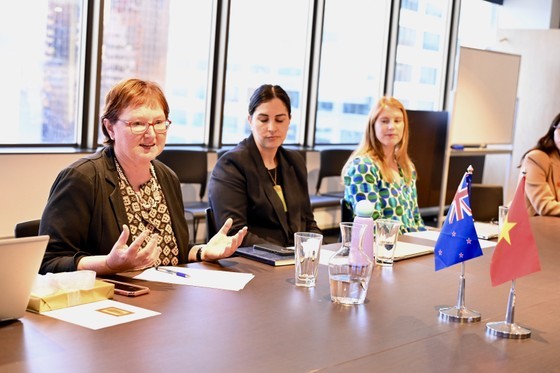 |
Ms. Sarah Free (L) shares Wellington's insights in smart city development. |
The key collaborators in the development of smart cities are the business community and experts. Throughout the construction process, the government consistently seeks input and ideas from experts, the business community, and citizens to further improve the smart city model.
Ms. Sarah Free and the council members exchanged and shared information about the capital city of Wellington, the Digital Twin smart city project, and the underground smart city development project to adapt to climate change and population growth.
Of which, the City Twin project is a notable example of using information technology to help the government rapidly gather real-time information for timely responses to various situations. For citizens, the project contributes to enhancing their experience by providing interactive, dynamic maps displaying data related to traffic and urban conditions.
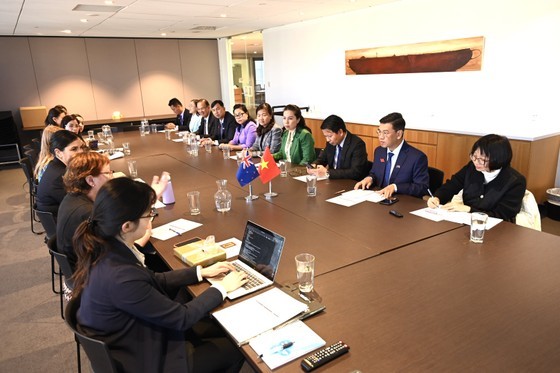 |
An overview of the working session |
According to Ms. Sarah Free, the development philosophy of Wellington revolves around prioritizing people and nature at the heart of its growth, with humanity developing harmoniously with nature. Simultaneously, technology is harnessed to construct a smart city that aligns with nature and its residents.
Over the past time, Wellington has played a significant role in the overall development of New Zealand, especially in smart urban development and information technology. These are also pivotal sectors driving the socioeconomic development of Wellington.
Collaborating to concretize Resolution 98
HCMC initiated its smart city development in 2017. The Deputy Chairman of the HCMC People's Council elaborated on the four primary pillars that the city relies on for its implementation: a shared data repository and open data ecosystem, a smart city operations center, a socioeconomics simulation and forecasting center, and an information security center. Moreover, HCMC is actively deploying six tasks in its smart city construction efforts.
Regarding the results, smart city development in HCMC has progressively assisted the business community and residents in accessing more streamlined administrative procedures, and effectiveness has gradually been enhanced.
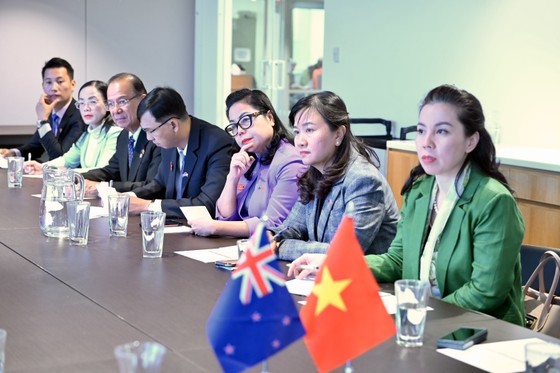 |
Members of the HCMC People's Council's delegation pose many questions on smart city development to Ms. Sarah Free and her colleagues. |
However, during the process of developing a smart city, HCMC has also faced difficulties and challenges, such as the imbalance between the excessively high population density compared to the current urban planning (around 4,300 people per square kilometer), limited information technology infrastructure, and decentralized and scattered data infrastructure.
Another challenge that the Deputy Chairman of the HCMC People's Council mentioned is that the residents and businesses in HCMC have not fully engaged in the process of building a smart city. They have not yet become true "co-authors" with the city in the planning and construction of the smart city.
In her response, Ms. Sarah Free pointed out that Wellington also encounters some challenges during the smart city development process. These challenges encompass the climate-adaptive smart city development as well as the financial aspects of implementation.
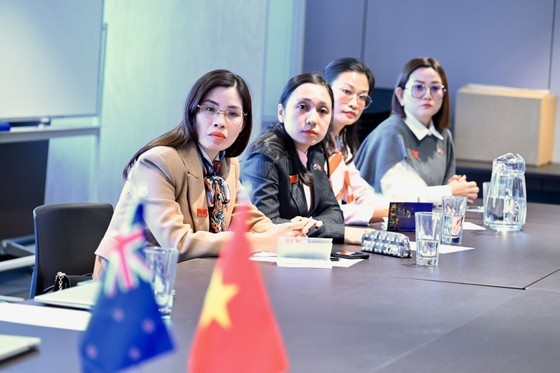 |
Members of the HCMC People's Council's delegation pose many questions on smart city development to Ms. Sarah Free and her colleagues. |
Building on that, the member of the Wellington City Council expressed the desire for both parties to sustain the exchange and sharing of information throughout the smart city development process. This collaborative effort aims to enhance services for the business community and residents in both cities.
HCMC is currently implementing Resolution 98 of the National Assembly regarding the pilot implementation of specific mechanisms and policies for the development of HCMC. Within this resolution, there is a focus on urban development, investment attraction, startups, creativity, and innovation.
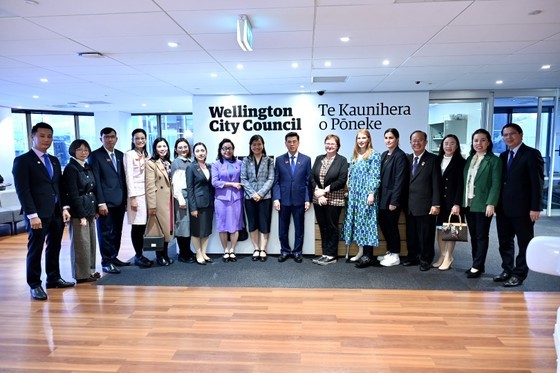 |
The HCMC People's Council's delegation visits the Wellington City Council. |
These are fields in which the capital city of Wellington excels. Deputy Chairman of the HCMC People's Council, Nguyen Van Dung, expressed the intention that in the future, Wellington and HCMC will continue to exchange, explore, and collaborate in these areas.
Addressing the topics of interest to the delegation, Ms. Sarah Free confirmed that these are areas of strength for Wellington, and the capital city of Wellington is willing to share and exchange experiences related to smart city development. Additionally, the two cities will further advance and strengthen their cooperation in the coming time.
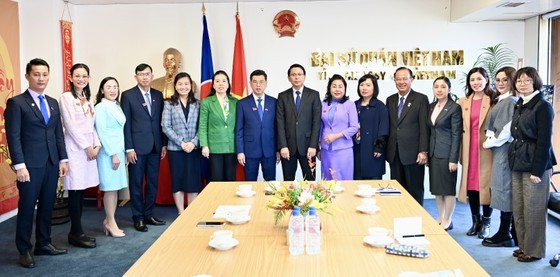 |
The HCMC People's Council's delegation visits and works with the Vietnamese Embassy in New Zealand. |
On the same day, the delegation of the HCMC People's Council visited and worked with the Vietnamese Embassy in New Zealand.

